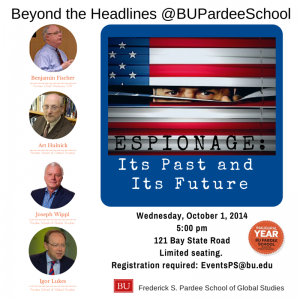BtH: The Future of Espionage
 The Frederick S. Pardee School of Global Studies at Boston University launched a new series of seminars called “Beyond the Headlines @BUPardeeSchool” with a panel discussion on “Espionage: Its Past and its Future.” Held on Wednesday, October 1, 2014, the panel brought together four seasoned experts to discuss trends in global intelligence and where they are headed. The one thing they agreed on was that the challenges to intelligence and espionage in the future will be harder, not easier.
The Frederick S. Pardee School of Global Studies at Boston University launched a new series of seminars called “Beyond the Headlines @BUPardeeSchool” with a panel discussion on “Espionage: Its Past and its Future.” Held on Wednesday, October 1, 2014, the panel brought together four seasoned experts to discuss trends in global intelligence and where they are headed. The one thing they agreed on was that the challenges to intelligence and espionage in the future will be harder, not easier.
The purpose of the new series of events is to cultivate informed conversations amongst experts and practitiners on issues that are currently in the news headlines, but to do so with a focus on intellectual analysis and on longer-range trends.
Benjamin Fischer, former chief historian of the US Central Intelligence Agency (CIA) and now at the Woodrow Wilson Institute, opened the discussion with a look back at the history of espionage in the CIA during the Cold War. He felt that during the Cold War the CIA missed many things, overall it got more things right than wrong. He particularly stressed that intelligence gathering is nuanced work. He pointed out that while the public image of espionage is of ‘cloaks and daggers’ a lot of the real work is hard and deep analysis, and ultimately that is what really matters.
Prof. Arthur Hulnick, Professor of the Practice at the Pardee School and a former CIA intelligence officer, felt that the main problem today is that intelligence agencies have become too risk-averse. He pointed out that intelligence needed daring, but most of all it requires intellectual daring and courage. The same point was reinforced by Prof. Joseph Wippl, Professor of the Practice at the Pardee School, who also stressed that analysis is at the heart of intelligence. He also pointed out that good intelligence actually makes decision-making more difficult, not less. It is, in fact, bad intelligence that makes decision-making easier, but also leads to bad decisions.
The conversation was moderated by Prof. Igor Lukes of the Pardee School of Global Studies. A lively discussion amongst the panelists and with the audience followed the initial remarks by the participants.